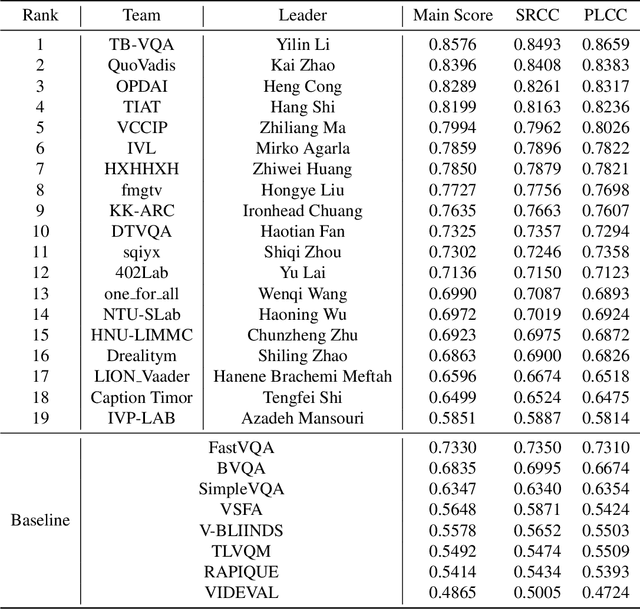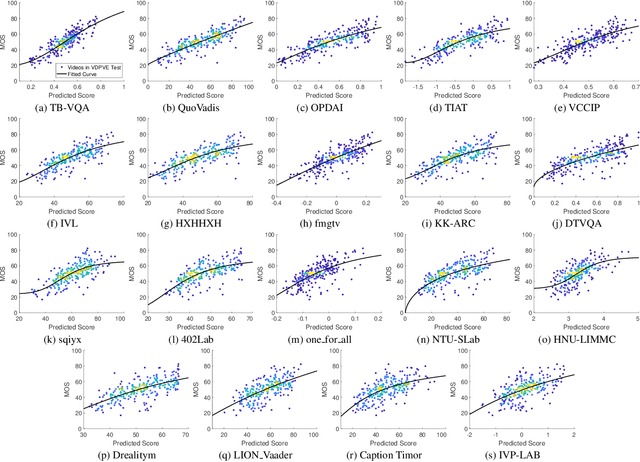Hossein Motamednia
NTIRE 2025 Challenge on Image Super-Resolution ($\times$4): Methods and Results
Apr 20, 2025Abstract:This paper presents the NTIRE 2025 image super-resolution ($\times$4) challenge, one of the associated competitions of the 10th NTIRE Workshop at CVPR 2025. The challenge aims to recover high-resolution (HR) images from low-resolution (LR) counterparts generated through bicubic downsampling with a $\times$4 scaling factor. The objective is to develop effective network designs or solutions that achieve state-of-the-art SR performance. To reflect the dual objectives of image SR research, the challenge includes two sub-tracks: (1) a restoration track, emphasizes pixel-wise accuracy and ranks submissions based on PSNR; (2) a perceptual track, focuses on visual realism and ranks results by a perceptual score. A total of 286 participants registered for the competition, with 25 teams submitting valid entries. This report summarizes the challenge design, datasets, evaluation protocol, the main results, and methods of each team. The challenge serves as a benchmark to advance the state of the art and foster progress in image SR.
Compressed image quality assessment using stacking
Feb 01, 2024Abstract:It is well-known that there is no universal metric for image quality evaluation. In this case, distortion-specific metrics can be more reliable. The artifact imposed by image compression can be considered as a combination of various distortions. Depending on the image context, this combination can be different. As a result, Generalization can be regarded as the major challenge in compressed image quality assessment. In this approach, stacking is employed to provide a reliable method. Both semantic and low-level information are employed in the presented IQA to predict the human visual system. Moreover, the results of the Full-Reference (FR) and No-Reference (NR) models are aggregated to improve the proposed Full-Reference method for compressed image quality evaluation. The accuracy of the quality benchmark of the clic2024 perceptual image challenge was achieved 79.6\%, which illustrates the effectiveness of the proposed fusion-based approach.
Deep Perspective Transformation Based Vehicle Localization on Bird's Eye View
Nov 12, 2023Abstract:An accurate understanding of a self-driving vehicle's surrounding environment is crucial for its navigation system. To enhance the effectiveness of existing algorithms and facilitate further research, it is essential to provide comprehensive data to the routing system. Traditional approaches rely on installing multiple sensors to simulate the environment, leading to high costs and complexity. In this paper, we propose an alternative solution by generating a top-down representation of the scene, enabling the extraction of distances and directions of other cars relative to the ego vehicle. We introduce a new synthesized dataset that offers extensive information about the ego vehicle and its environment in each frame, providing valuable resources for similar downstream tasks. Additionally, we present an architecture that transforms perspective view RGB images into bird's-eye-view maps with segmented surrounding vehicles. This approach offers an efficient and cost-effective method for capturing crucial environmental information for self-driving cars. Code and dataset are available at https://github.com/IPM-HPC/Perspective-BEV-Transformer.
NTIRE 2023 Quality Assessment of Video Enhancement Challenge
Jul 19, 2023



Abstract:This paper reports on the NTIRE 2023 Quality Assessment of Video Enhancement Challenge, which will be held in conjunction with the New Trends in Image Restoration and Enhancement Workshop (NTIRE) at CVPR 2023. This challenge is to address a major challenge in the field of video processing, namely, video quality assessment (VQA) for enhanced videos. The challenge uses the VQA Dataset for Perceptual Video Enhancement (VDPVE), which has a total of 1211 enhanced videos, including 600 videos with color, brightness, and contrast enhancements, 310 videos with deblurring, and 301 deshaked videos. The challenge has a total of 167 registered participants. 61 participating teams submitted their prediction results during the development phase, with a total of 3168 submissions. A total of 176 submissions were submitted by 37 participating teams during the final testing phase. Finally, 19 participating teams submitted their models and fact sheets, and detailed the methods they used. Some methods have achieved better results than baseline methods, and the winning methods have demonstrated superior prediction performance.
 Add to Chrome
Add to Chrome Add to Firefox
Add to Firefox Add to Edge
Add to Edge